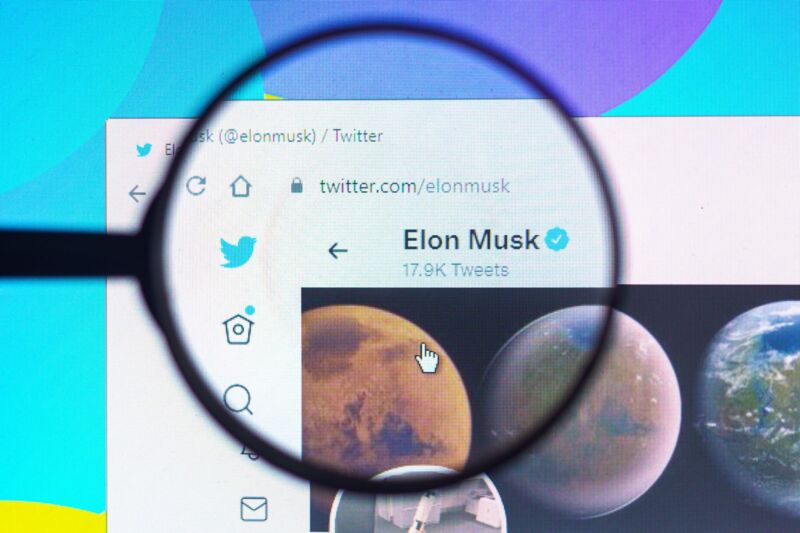
Elon Musk is being investigated over “conduct” related to his pending acquisition of Twitter, the company said in an October 6 court filing that was just made public yesterday. “Elon Musk is presently under investigation by federal authorities for his conduct in connection with the acquisition of Twitter,” Twitter told Delaware Court of Chancery Judge Kathaleen McCormick.
Twitter’s filing mostly describes its efforts to obtain documents related to the ongoing investigations. It says a privilege log produced by Musk’s law firm refers to “drafts of a May 13 email to the SEC [Securities and Exchange Commission]” and “a slide presentation to the FTC [Federal Trade Commission],” but that “the final communications themselves were neither produced nor logged.”
“Through counsel, he has exchanged substantive correspondence with those authorities concerning their investigations,” Twitter wrote. “Twitter wants those documents, because they bear upon key issues in this litigation. Twitter requested the production of those documents months ago. But with trial just 11 days away, Defendants have still not produced them.”
Twitter made this court filing just before McCormick delayed the trial to give Musk and Twitter three weeks to close the on-again, off-again $44 billion merger. Twitter wrote that Musk’s “game of ‘hide the ball’ must end,” and asked the court for an order compelling “the production of Defendants’ lawyers’ communications with the government concerning Twitter and the Twitter transaction.”
Twitter blasts Musk for “stonewalling”
Twitter said it has been seeking the documents since July 22, and described Musk’s attempts to avoid producing them as follows:
Defendants initially resisted production by reserving the right to withhold communications based on something they called “investigative privilege.” After the Court cast doubt on that species of “privilege,” Defendants have adopted a new approach. Instead of logging the communications as privileged, they simply deemed them outside the scope of discovery, on the theory that the search protocol Twitter negotiated with Defendants’ counsel somehow missed the mark.
“The obvious explanation for Defendants’ stonewalling is that they do not want Twitter to obtain documents that will further undermine Defendants’ position in this litigation,” Twitter also wrote. “But that is no excuse. Defendants should be compelled to cause their law firms to collect and produce the requested communications immediately.”
The SEC questioned Musk over his May 17 tweet claiming the “deal cannot move forward until” Twitter CEO Parag Agrawal justifies the company’s spam-account estimates. The SEC told Musk that the “term ‘cannot’ suggests that Mr. Musk and his affiliates are exercising a legal right” under the merger agreement to suspend the acquisition, but “we note that the Schedule 13D has not been amended to reflect the apparent material change.”
The SEC was also investigating Musk’s late disclosure of his 9.2 percent stake in Twitter, which he amassed before launching the attempt to buy the company outright. The FTC also reportedly opened an inquiry into whether Musk failed to comply with an antitrust reporting requirement related to that stake. Musk’s initial filing indicated he intended to be a passive shareholder but he later refiled it to classify himself as an active investor.
Musk lawyer accuses Twitter of “misdirection”
Musk’s lawyer claimed Twitter’s filing is a “misdirection,” according to Reuters. “Alex Spiro, an attorney for Musk, told Reuters that Twitter’s court filing was a ‘misdirection’ and asserted: ‘It is Twitter’s executives that are under federal investigation.'”
Twitter’s filing said, “Defendants do not deny that their counsel exchanged responsive, non-privileged communications with governmental authorities concerning Musk’s acquisition of Twitter. Instead, they seek to shield these documents from discovery by asserting that Twitter’s request for production comes ‘too late’ and that their counsel agreed only to produce documents identified through the application of agreed-upon search terms. Neither argument has any merit.”
Noting that Twitter requested the documents in July and made further attempts to get the same documents in August, the company said: “Defendants have resisted and delayed production for months. They cannot now cite their own obstruction as a basis for denying Twitter the documents that it requested from the outset.” Additionally, Twitter said that search terms “do not supply an excuse for avoiding the production of relevant responsive documents that are known to counsel, such as the government communications at issue on this Motion.”
The court case could end without a trial if Twitter and Musk complete the acquisition. Musk recently said he’ll close the deal despite previously attempting to get out of it, leading to the trial being delayed. But Twitter said in another court filing last week that there is a problem with Musk’s financing and that Musk won’t commit to a closing date.
Judge McCormick previously criticized Musk for withholding text messages, citing “glaring deficiencies” in the Musk side’s document production. McCormick was also considering whether to sanction Musk for failing to produce Signal messages, which were apparently deleted using Signal’s automatic deletion feature.
https://arstechnica.com/?p=1890082

